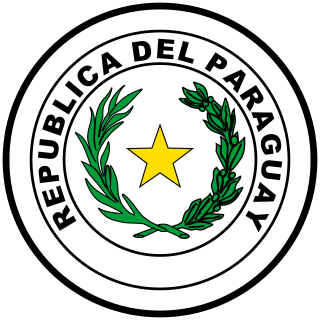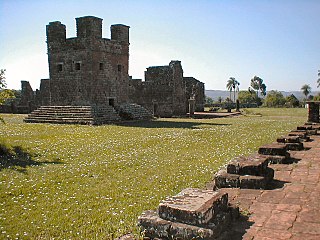 W
WGeneral elections were held in Paraguay on 15 February 1953. At the time, the Colorado Party was the only legally permitted party. As such, Colorado presidential candidate Federico Chávez was elected unopposed.
 W
WPresidential elections were held in Paraguay on 11 July 1954, following a military coup on 8 May which toppled Federico Chávez who had been re-elected the previous year. At the time, the Colorado Party was the only legally permitted party. As such, Colorado presidential candidate Alfredo Stroessner was elected unopposed.
 W
WGeneral elections were held in Paraguay on 9 February 1958. At the time, the Colorado Party was the only legally permitted party. As such, incumbent president Alfredo Stroessner was re-elected unopposed.
 W
WParliamentary elections were held in Paraguay in 1960 after President Alfredo Stroessner had dissolved Congress. The elections were boycotted by the opposition in protest at insufficient guarantees of freedom. and subsequently all 60 seats were won by the Colorado Party.
 W
WGeneral elections were held in Paraguay on 10 February 1963. Opposition parties had been legalized just a year earlier, after a 15-year period in which the Colorado Party was the only legally permitted party.
 W
WGeneral elections were held in Paraguay on 11 February 1968. Alfredo Stroessner of the Colorado Party won the presidential elections, whilst the Colorado Party won 20 of the 30 seats in the Senate and 40 of the 60 seats in the Chamber of Deputies. Voter turnout was 73.1%.
 W
WGeneral elections were held in Paraguay on 11 February 1973. Alfredo Stroessner of the Colorado Party won the presidential elections, whilst the Colorado Party won 20 of the 30 seats in the Senate and 40 of the 60 seats in the Chamber of Deputues. Voter turnout was 77.4%.
 W
WConstitutional Assembly elections were held in Paraguay on 6 February 1977. The Colorado Party was the only party to contest the elections, and won all seats. Voter turnout was 82.8%. Following the election, the constitution was amended to scrap term limits, allowing President Alfredo Stroessner to contest the 1978 elections.
 W
WGeneral elections were held in Paraguay on 12 February 1978. Alfredo Stroessner of the Colorado Party won the presidential elections, whilst the Colorado Party won 20 of the 30 seats in the Senate and 40 of the 60 seats in the Chamber of Deputues. Voter turnout was 86.0%.
 W
WThe 1982–83 Paraguay floods refers to major flooding that primarily affected the Paraná River basin in the La Plata Basin of Paraguay in the fall of 1982 and beginning of 1983. The flooding was caused by El Niño and also affected parts of Brazil, Argentina and Bolivia. Although only 170 were killed as a direct result of the floods, 600,000 people were evacuated from their homes and in the end the damage rose to around $3 billion. Affecting an estimate of 85,000 people solely in Paraguay, the flood waters had risen from an average of 2.6 meters to above 9 meters. This resulted in several national along with international voluntary agencies donating over $70,000.
 W
WGeneral elections were held in Paraguay on 6 February 1983. Alfredo Stroessner of the Colorado Party won the presidential elections, whilst the Colorado Party won 20 of the 30 seats in the Senate and 40 of the 60 seats in the Chamber of Deputues. Voter turnout was 92.6%.
 W
WGeneral elections were held in Paraguay on 14 February 1988. Alfredo Stroessner of the Colorado Party won the presidential elections, whilst the Colorado Party won 20 of the 30 seats in the Senate and 40 of the 60 seats in the Chamber of Deputues. Voter turnout was 92.2%.
 W
WEarly general elections were held in Paraguay on 1 May 1989, following a military coup on 3 February which toppled Alfredo Stroessner who had been re-elected the previous year. For the first time in several years, the opposition was allowed to contest the elections more or less unmolested; the Communists were the only party that was banned from taking part.
 W
WConstitutional Assembly elections were held in Paraguay on 1 December 1991. The result was a victory for the Colorado Party, which won 122 of the 198 seats. Voter turnout was 51.7%. Following the election, a new constitution was published in 1992. The new constitution reintroduced the position of Vice President and allowed for the President to be elected by a plurality of the vote.
 W
WGeneral elections were held in Paraguay on 9 May 1993. In the first free election in the country's 182-year history, as well as the first with no military candidates since 1928, Juan Carlos Wasmosy of the Colorado Party won the presidential election with 41.8 percent of the vote.
 W
WGeneral elections were held in Paraguay on 10 May 1998. The presidential elections were won by Raúl Cubas Grau of the Colorado Party, who received 55.3% of the vote. In the Congressional elections, the Colorado Party won 45 of the 80 seats in the Chamber of Deputies and 24 of the 45 seats in the Senate, defeating the Democratic Alliance formed by the Authentic Radical Liberal Party and the National Encounter Party. Voter turnout was 80.5%.
 W
WVice Presidential elections were held in Paraguay on 13 August 2000, following the assassination of Luis María Argaña. The result was a victory for Julio César Franco of the Authentic Radical Liberal Party, who received 49.6% of the vote. Voter turnout was 60.7%.
 W
WGeneral elections were held in Paraguay on 27 April 2003. The presidential elections were won by Nicanor Duarte of the Colorado Party, who received 38.3% of the vote. In the Congressional elections, the Colorado Party won 37 of the 80 seats in the Chamber of Deputies and 16 of the 45 seats in the Senate. Voter turnout was 64.3% in the presidential election, 64.2% in the Senate election and 64.1% in the Chamber of Deputies election.
 W
WA referendum on allowing expatriate citizens to vote was held in Paraguay on 9 October 2011. The measure was approved by 78% of voters, although voter turnout was only 12.5%. If approved by the Congress, the measure would give the right to vote to more than half a million Paraguayans living abroad, mostly in Argentina, Spain and the United States. President Fernando Lugo believed it would strengthen Paraguay's democracy.
 W
WThe Battle of Tatayiba was a cavalry engagement between a Paraguayan force led by future President Bernardino Caballero and a Brazilian force led by the Duke of Caxias. The Brazilians, outnumbering the Paraguayans nearly 3 to 2, were victorious.
 W
WElections in Paraguay gives information on election and election results in Paraguay.
 W
WThe Governorate of Paraguay, originally called the Governorate of Guayrá, was a governorate of the Spanish Empire and part of the Viceroyalty of Peru. Its seat was the city of Asunción; its territory roughly encompassed the modern day country of Paraguay. The Governorate was created in December 16, 1617 by the royal decree of King Philip III as a split of the Governorate of the Río de la Plata and of Paraguay into its respective halves. The Governorate lasted until 1782, after which the massive Viceroyalty of Peru was split, and Paraguay became an intendency (intendencia) of the new Viceroyalty of the Río de la Plata.
 W
WLa Santisima Trinidad de Paraná, or the Most Holy Trinity of Paraná, is the name of a former Jesuit reduction in Paraguay. It is an example of one of the many Jesuit reductions, small colonies established by the missionaries in various locations in South America, such as Brazil, Argentina and Paraguay throughout the 17th and 18th century. These missions were built as self-contained societies that existed outside of regular Spanish colonial life that integrated indigenous populations with Christian faith.
 W
WThe Bicentennial of the Independence of the Republic of Paraguay is a group of festivities that took place in Paraguay and Paraguayan communities abroad, on the occasion of the celebration of 200 years of Independence of Paraguay from Spanish Empire in 1811. The activities in relation to Bicentennial of Paraguay took off in 2010 and culminated in late 2011.
 W
WConstitutional Assembly elections were held in Paraguay on 7 May 1967. The Colorado Party won 80 of the 120 seats. Voter turnout was 68.9%. Following the election, the country's fifth constitution was promulgated in August.
 W
WMargarita Prieto Yegros was a Paraguayan writer, historian, and journalist.